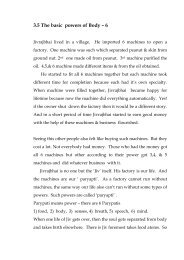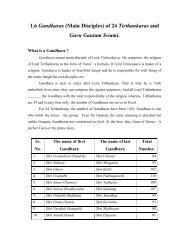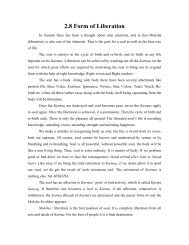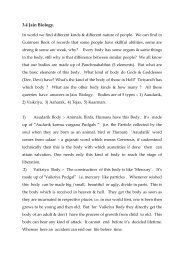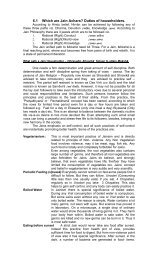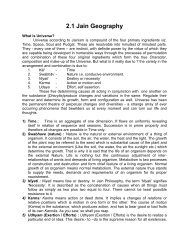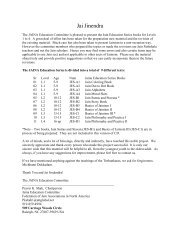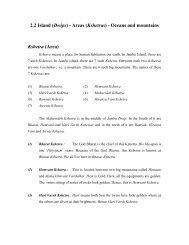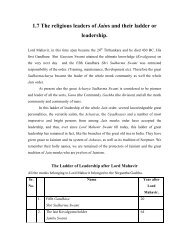âæ¢ ç¸ï¼¯ï¼ è£æ½® J - Jainism, Jain Religion - colleges
âæ¢ ç¸ï¼¯ï¼ è£æ½® J - Jainism, Jain Religion - colleges
âæ¢ ç¸ï¼¯ï¼ è£æ½® J - Jainism, Jain Religion - colleges
Create successful ePaper yourself
Turn your PDF publications into a flip-book with our unique Google optimized e-Paper software.
When Shreyans saw approaching Rishabhdev, he rushed to welcome his great grandfather. After bowing at the great ascetics<br />
feet when Shreyans looked at Rishabhdev’s face he could not shift his gaze. He went into a state of meditative thoughts<br />
and suddenly he acquired Jati-smaran Jnan, the knowledge that opens up memories of the past births. In his past birth<br />
Shreyans was the charioter of king Vajranath (the past incarnation of Rishabhdev). This knowledge also made him aware of<br />
the duties of laity toward Shramans. He realized that Bhagavan Rishabhdev had been wandering around without food or<br />
water due to prevailing ignorance of the people regarding ascetic norms.<br />
With due reverence he requested Rishabhdev, “Prabhu! I am honored by your presence. I have just received 108 pitchers<br />
full of fresh sugar-cane juice that are pure and suitable for you in all respects. Kindly accept the juice and break your fast”.<br />
Rishabhdev extended his cupped palms and Shreyans poured the sugar cane juice from a pitcher. Rishabhdev broke his fast<br />
and the skies reverberated with the sound of divine drums and divine applauds, “Hail the alms giving!” The gods also<br />
showered gems, flowers and perfumes.<br />
„±üü ¿¢¢Ý¢² ½±¼é J<br />
day after the penance of Varshi Tap (one meal and fast on alternate days for one year). (R-4/b)<br />
This was the beginning of the tradition of religious charity and alms giving. In memory of this incident, the third day of the<br />
bright half of the month of Vaishakh is celebrated as Akshay Tritiya festival. The <strong>Jain</strong>s specifically celebrate it as the breakfast<br />
Omniscience and Nirvana<br />
For one thousand years Bhagavan Rishabhdev continued his harsh spiritual practices completely ignoring his body and other<br />
mundane activities. On the eleventh day of the dark half of the month of Phalgun he was meditating under a banyan tree in<br />
the Shakatmukh garden outside Purimtal town, close to Ayodhya. Around forenoon he transcended to the purest higher state<br />
of meditation. The intensity of his practice caused the shedding of the knowledge and perception obscuring Karmas as well<br />
as the illusory Karmas. As a result, he attained omniscience, the purest and enlightened state of soul. Rishabhdev became<br />
a Jina.<br />
When Rishabhdev attained omniscience the whole world was filled with a soothing glow for a moment. Numerous gods<br />
descended from heavens to pay their respects to the Tirthankar. They also created the Samavasarana, the divine pavilion.<br />
King Bharat also proceeded toward the divine assembly riding an elephant and taking along his grandmother Marudeva.<br />
Apprehensive about the hardships of the ascetic life of her son, Marudeva was relieved when she beheld the scintillating face<br />
of Rishabhdev sitting in the divine assembly surrounded by happy and dazzling gods. The vision of her son perched on the<br />
spiritual pinnacle triggered the flow of spontaneous joy in the heart of Marudeva. This mundane joy slowly turned into the<br />
ultimate bliss and she acquired omniscience. Coincidentally, at the same moment she completed her age and became a<br />
liberated soul (Siddha). Bhagavan Rishabhdev made the announcement that Marudeva had become a Siddha.<br />
In his first discourse Rishabhdev detailed the trilogy of right perception, right knowledge, and right conduct. Knowing about<br />
the significance of life as<br />
jainuniversity.org<br />
a human being and importance of a dutiful life, thousands of people including Rishabhsen, the eldest<br />
son of Emperor Bharat, and five hundred other members of the royal family embraced the acetic way of life. Thousands of<br />
other persons accepted the Shravak Dharm (the religious way for laity). As he founded the four-pronged religious ford at the<br />
beginning of the present era, Bhagavan Rishabhdev became popularly known as Adinath, the first Tirthankar.<br />
The first disciple of Bhagavan Rishabhdev was Rishabhsen. He became the first chief disciple. He was also known as<br />
Pundarik.<br />
Liberation<br />
For a long time Bhagavan Rishabhdev continued to propagate his religion having the five great vows as its central theme.<br />
When he realized that all his remaining Karmas are approaching their end he proceeded to the Ashtapad Mountain. On the<br />
thirteenth day of the dark half of the month of Magh, a little before noon time, Rishabhdev, alongwith ten thousand other<br />
ascetics, was observing a six-day fast without water. He was sitting in meditation in the Paryanka pose. When the moon<br />
entered the Abhijit lunar mansion he got nirvana and got liberated from all sorrows.<br />
The king of gods, Saudharmendra, Emperor Bharat, numerous gods and men gathered and celebrated the auspicious event<br />
of Bhagavan Rishabhdev’s gathered and celebrated the auspicious event of Bhagavan Rishabhdev’s Nirvana.<br />
2. BHAGAVAN AJITNATH<br />
The soul that became Bhagavan Ajitnath, in its earlier incarnation, was the great king Vimalvahan of Susima City in Mahavideha<br />
area. He lea a pious life in spite of the available princely grandeur. At an appropriate time, he became an ascetic under<br />
Arindam Suri. Meditating about the omniscient and liberated souls and indulging in harsh penance, he purified his soul to a<br />
level where he could earn the Tirthankar-nam-and-gotra-karma. Completing his age, he reincarnated as a god in the Vijayaanuttar-dimension.<br />
Amar Muni - Tirthankar Charitra - Surana # 12<br />
www.jainuniversity.org




